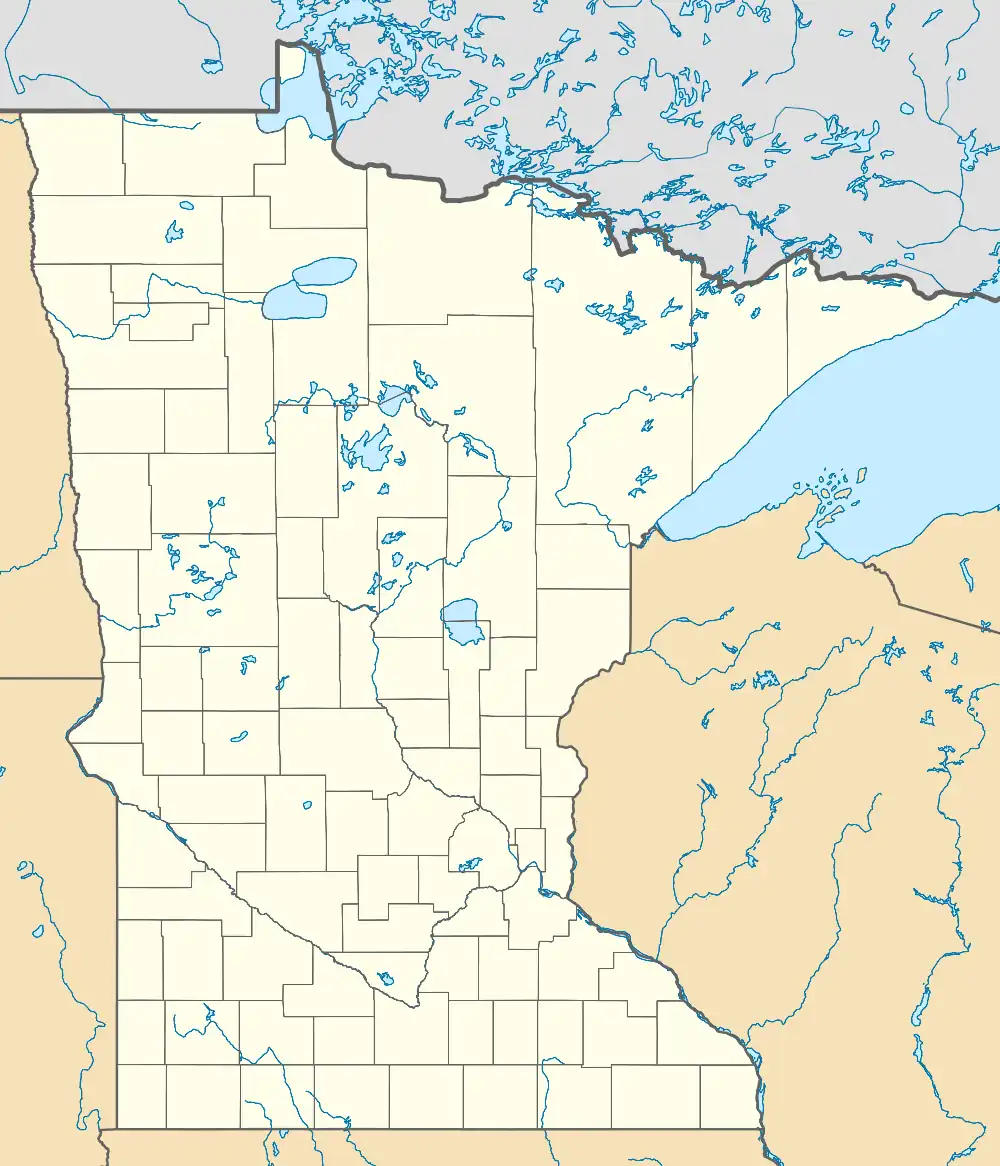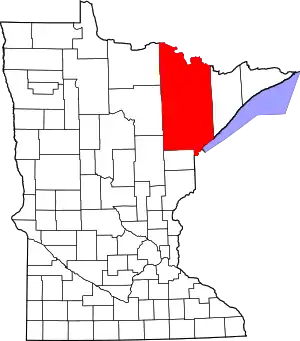Breitung Township, St. Louis County, Minnesota
Breitung Township is a township in Saint Louis County, Minnesota, United States. The population was 605 at the 2010 census.[3]
Breitung Township, Minnesota | |
|---|---|
 Breitung Township, Minnesota Location within the state of Minnesota  Breitung Township, Minnesota Breitung Township, Minnesota (the United States) | |
| Coordinates: 47°49′32″N 92°14′16″W | |
| Country | United States |
| State | Minnesota |
| County | Saint Louis |
| Area | |
| • Total | 38.9 sq mi (100.6 km2) |
| • Land | 23.0 sq mi (59.6 km2) |
| • Water | 15.8 sq mi (41.1 km2) |
| Elevation | 1,358 ft (414 m) |
| Population (2010) | |
| • Total | 605 |
| • Density | 16/sq mi (6.0/km2) |
| Time zone | UTC-6 (Central (CST)) |
| • Summer (DST) | UTC-5 (CDT) |
| FIPS code | 27-07534[1] |
| GNIS feature ID | 0663660[2] |
State Highway 1 (MN 1) and State Highway 169 (MN 169) serve as the main route in the township. The unincorporated community of Soudan is located within Breitung Township. Breitung Township is located along part of Lake Vermilion. The city of Tower is nearby.
History
The township is named after Edward Breitung,[4] who was a miner from Michigan and a former U.S. Representative from that state; in the 1880s, he helped to develop the Soudan Mine in the township. Soudan Underground Mine State Park is located within Breitung Township.
Geography
According to the United States Census Bureau, the township has a total area of 38.8 square miles (100 km2); 23.0 square miles (60 km2) is land and 15.9 square miles (41 km2), or 40.80%, is water.
Stuntz Bay, Armstrong Bay, Bass Bay, and Canfield Portage Bay of Lake Vermilion are located within Breitung Township.
Adjacent townships, cities, and communities
The following are adjacent to Breitung Township :
- The city of Tower (west)
- Greenwood Township (west)
- Fortune Bay (west)
- Eagles Nest Township (east)
- Bear Head Lake State Park (east-southeast)
- Bear Island State Forest (southeast)
- Kugler Township (south)
- The unincorporated community of Wahlsten (south)
- Vermilion Lake Township (southwest)
- The unincorporated community of Peyla (southwest)
Census-designated place (CDP)
- Soudan – Unincorporated community
Demographics
As of the census[1] of 2000, there were 662 people, 292 households, and 190 families residing in the township. The population density was 28.8 inhabitants per square mile (11.1/km2). There were 523 housing units at an average density of 22.7 per square mile (8.8/km2). The racial makeup of the township was 97.89% White, 0.45% African American, 0.76% Native American, 0.30% Asian, 0.15% from other races, and 0.45% from two or more races. Hispanic or Latino of any race were 0.45% of the population.
There were 292 households, out of which 21.9% had children under the age of 18 living with them, 54.8% were married couples living together, 5.8% had a female householder with no husband present, and 34.6% were non-families. 29.1% of all households were made up of individuals, and 15.4% had someone living alone who was 65 years of age or older. The average household size was 2.22 and the average family size was 2.75.
In the township the population was spread out, with 20.1% under the age of 18, 4.7% from 18 to 24, 24.3% from 25 to 44, 28.9% from 45 to 64, and 22.1% who were 65 years of age or older. The median age was 46 years. For every 100 females, there were 110.8 males. For every 100 females age 18 and over, there were 110.8 males.
The median income for a household in the township was $40,750, and the median income for a family was $51,250. Males had a median income of $40,000 versus $29,107 for females. The per capita income for the township was $20,134. About 10.9% of families and 17.3% of the population were below the poverty line, including 31.5% of those under age 18 and 7.6% of those age 65 or over.
References
- "U.S. Census website". United States Census Bureau. Retrieved January 31, 2008.
- "US Board on Geographic Names". United States Geological Survey. October 25, 2007. Retrieved January 31, 2008.
- "Race, Hispanic or Latino, Age, and Housing Occupancy: 2010 Census Redistricting Data (Public Law 94-171) Summary File (QT-PL), Breitung township, St. Louis County, Minnesota". United States Census Bureau. Retrieved August 24, 2011.
- Upham, Warren (1920). Minnesota Geographic Names: Their Origin and Historic Significance. Minnesota Historical Society. p. 478.
